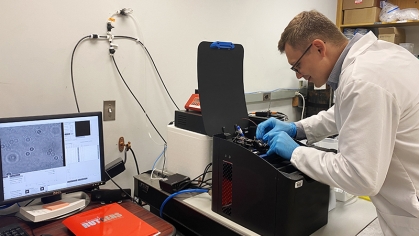Bo Yuan is NSF CAREER Award Recipient

Five-year grant supports framework design for robotic motion-planning applications
Bo Yuan, an assistant professor in the School of Engineering’s Department of Electrical and Computer Engineering (ECE), has been awarded a $500,00 National Science Foundation (NSF) CAREER award to support his project, Chimp, a co-design framework for fast and energy efficient motion planning for real-world robotic applications.
The highly competitive and respected NSF CAREER grant funds research and educational initiatives of faculty at the beginning of their careers. Yuan, who earned his doctoral degree from the University of Minnesota, has been a member of the ECE faculty since 2018.
“I feel very honored and humbled to receive this award,” says Yuan. “It’s a huge recognition of the research work that my students and I have conducted – and is very exciting news. The most exciting thing about it to me is that NSF and the broad community are now recognizing the importance of robotic computing. This award is a very good sign for this emerging trend.”
Yuan is currently working on other NSF projects related to AI and robotic control. “Putting them all together, I aim to build a comprehensive framework for improving the efficiency of modern intelligent systems across different platforms and thus make AI more accessible and affordable for everyone,” he says.
A Boon for Academia and Industry
The actions of robots in applications as far-ranging as autonomous driving, in-warehouse package handling, and assisted surgery are dependent on motion planning capabilities.
Yet, according to Yuan, as modern AI techniques are adopted in robots, efficiency problems such as high energy consumption and computational costs have become more severe, creating a need to develop more efficient hardware.
“Pursuing higher effectiveness is a key project goal,” he says. “With Chimp, modern robotics systems would be able to use less time and energy to make high-quality decisions for the movement and navigation of robots, which will reduce the risk of accidents and reduce carbon footprint emissions.
“By promoting the development of new types of chip design and AI algorithms, it will ultimately open up new research and business opportunities in academia and industry.”
A Benefit for Students
Expanding educational opportunities is part of the NSF CAREER grant program. “Bo’s leading-edge research project will ultimately enhance the curricula in fields ranging from BME to mechanical engineering and computer science, whether by forming the basis for new courses or including research outcomes into existing courses,” says ECE professor and department chair Yingying Chen. “Such curricular enrichment is key to our successful preparation of the next generation of ECE leaders and innovators.”
Yuan will also leverage emerging content from the Chimp project – from AI and robotics to chip design – to promote the interest of minority K-!2 and undergraduate students in STEM fields. “I’ll collaborate with several Rutgers programs so students can really feel that what they are working on in STEM can generate direct technical, economic, and social impacts. I’ll also give lectures in local K-12 schools and advise high school students with WINLAB summer internships,” he concludes.


